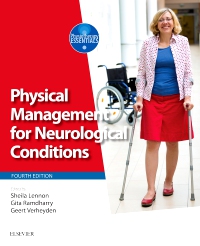
Physical Management for Neurological Conditions Elsevier eBook on VitalSource, 4th Edition
Elsevier eBook on VitalSource

Now $42.74
The second edition of the Neurological Physiotherapy Pocketbook is the only book for physiotherapists that provides essential evidence-based information in a unique and easy-to-use format, applicable to clinical settings.
Written by new international editors and contributors, this pocketbook provides quick and easy access to essential clinical information.
Key feature:
- Pocketbook size for when out on clinical placement or working in clinical practice
- Revised and brand new chapters on neurological rehabilitation and essential components
- Concentrates on the six most common conditions: including stroke, traumatic brain, and spinal cord injury
- Key messages highlighted for assessment, treatment, and measurement of the most common neurological conditions
Together with the textbook Physical Management for Neurological Conditions (4th edition), it presents all essential components and conditions for undergraduates and therapists working in neurological practice.
Newer Edition Available
Physical Management for Neurological Conditions - Elsevier eBook on VitalSource
-
Pocketbook size for when out on clinical placement or working in clinical practice
Revised and brand new chapters on neurological rehabilitation and essential components
Concentrates on the six most common conditions: including stroke, traumatic brain, and spinal cord injury
Key messages highlighted for assessment, treatment, and measurement of the most common neurological conditions
-
- Fully revised by international contributors with the inclusion of 8 new chapters covering:
- Common impairments
- Inherited neurological disorders
- Complex case management
- Virtual reality and interactive gaming technologies
-
1. Guiding principles of neurorehabilitation
2. Common impairments and the impact on activity
3. Observation and analysis of movement
4. Measurement tools
5. Goal setting in stroke rehabilitation
6. Respiratory management
7. Stroke
8. Traumatic brain injury
9. Spinal cord injury
10. Multiple sclerosis
11. Parkinson's
12. Inherited neurological conditions (HD, SCA, HSP)
13. Motor neuron disease
14. Polyneuropathies
15. Muscle disease
16. Functional motor disorders
17. Self-management
18. Virtual rehabilitation: Virtual reality and interactive gaming technologies in neurorehabilitation
19. Falls and their management
20. Physical activity and exercise
21. Vestibular rehabilitation
22. Pain management
23. Clinical neuropsychology in rehabilitation
24. Complex case management


 as described in our
as described in our 